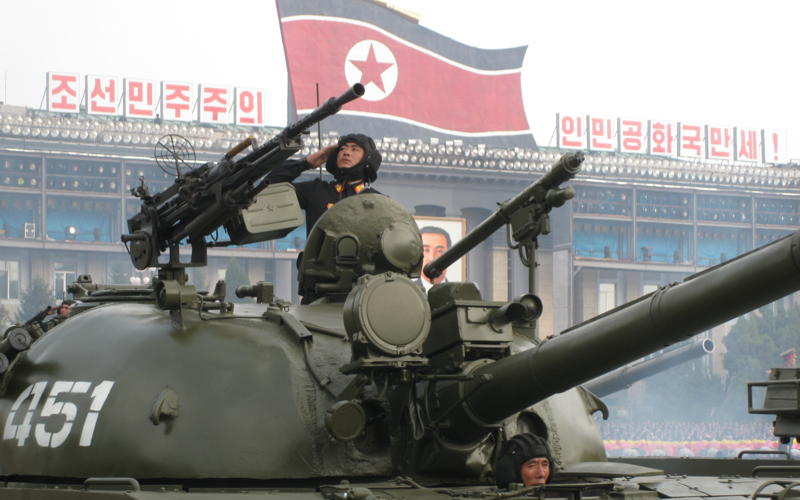
Economic Implications of a Conflict with North Korea
Compared to recent United States military ventures, a war with North Korea would have much greater risks and economic consequences for the United States and its allies.
North Korea is primarily a threat to two densely populated, economically developed nations: Japan and South Korea. It also borders China and Russia. Though Russia and China are not likely to get involved in a potential conflict, this does set up the remote possibility of the largest economies in terms of Purchasing Power Parity (PPP) GDP nations becoming entangled on the Korean Peninsula.
The supply chains most likely to be disrupted are in Japan and South Korea. The single largest economic risk posed by North Korea is not necessarily the nuclear arms that have become a burgeoning focus point in the Korean crisis, though that is a tail risk that is growing in size. The biggest risk is to the population centers of South Korea and Japan. North Korea has the ability to do immense damage to Seoul and urban Japan within the first hours of military conflict, as North Korea possesses the largest artillery of any nation.
South Korea- a nation of 51 million people – is a large importer of United States agricultural products as well as being a net exporter to the U.S. In 2013, South Korea became the 5th largest importer of American agricultural products, importing a total of $5.1 billion that year. In 2016, South Korea exported $69.9 billion in total goods to the United States while importing $42.3 billion from the U.S. for a total trade volume well over $100 billion. Much of the infrastructure supporting that trade, as well as the consumers who create the demand for United States imports, is currently at risk from conventional munitions from North Korea – particularly Seoul, which houses half of the nation’s population and is the 16th largest city in the world. It’s worth noting that South Korea also hosts about 40,000 American troops.
Policymakers and strategists need to anticipate the large supply chain that would be at risk which could prove disastrous to Emerging Markets in the Pacific Rim region as well as the US, as large scale disruptions to the agricultural exports of the U.S. could hurt farmers and pricing of agricultural commodities domestically. It could also hurt Brazil, Australia, and New Zealand, who are also notable trade partners with Korea.
The risks to Japan and Japanese supply chains are harder to quantify, as it is difficult to anticipate North Korea’s strategies. If it were to pursue a campaign of bombing Japanese urban centers within the early stages of the war, the human-capital impact could be immense. Tokyo alone is estimated to be the largest metropolitan area, with a population of 37 million and a GDP of $2 Trillion ($70,000 per capita). Given the high degree of development it’s possible that large scale damages to a city like Tokyo could be absorbed relatively well, but it’s nearly impossible to estimate the potential risk.
In total, Japan exported $132 billion to the US and imported $62 billion of American goods last year. It would seem that Japanese supply chains are less at risk than South Korean supply chains, as the North Korean arsenal has fewer weapons to choose from if it attacked Japan. For instance, all of South Korea’s ports could be hit by North Korea fairly easily within hours, whereas Japan would likely have time to react to opening hostilities with the Juche regime and defend critical economic infrastructure.
Potential Gains for Regional Players
The potential economic gains for the United States and its allies are much more limited than past conflicts recently. North Korea has relatively scant resources to develop, and the potential trade partners for those resources when eventually developed are few. It is likely that coal exports to China from the region will remain the dominant economic product even after potential reunification with the South.
China stands to gain the most from a conflict in North Korea, especially if it doesn’t have to commit any military resources. China has an interest in rare earth minerals and mining, and a potential new market or new contracts for Chinese firms to exploit. North Korean mineral deposits likely intrigue the Xi Jinping administration. Bloomberg published an article in 2012 citing the potential value of rare earth minerals in North Korea to be $6 trillion or more.
While China would likely profit the most from the potential defeat of Kim Jong Un, Russia also stands to gain a small amount peripherally from the conflict. Since the time of the Russo-Japanese war of 1904, Russia has harbored desires to gain access to new markets in the Korean peninsula and Manchuria. At the moment, Kim Jong Un’s policies do not make it easy to access trade with the peninsula despite the fact that Russia’s major Pacific port (Vladivostok) is less than 80 miles from the North Korean border. While it may not be high on the list of Vladimir Putin’s target markets for Russian exports, in the long run it’s easy to see how a post-Juche North Korea could benefit Russian exports.
All three states that border North Korea face similar risks in human capital flow terms. North Koreans would pour over borders to escape both the conflict itself and the difficult economic realities of life in the North. China does not want hundreds of thousands (or millions) of Korean refugees coming into its struggling Northern regions and putting strains on local social security systems. The linguistic, cultural, and educational gap between North Koreans and modern Chinese citizens is such that it’s difficult to imagine a smooth integration of these potential migrant populations.
The potential hardships for Koreans entering Russia are greater still. Russia currently is struggling economically under a restructuring of trade in the midst of sanctions from former Western trade partners, and thus has to rely increasingly on China and Central Asian states, conducting more trade in Yuan/Ruble denomination and less in dollars or Euros. Despite this “Eastern pivot,” new infrastructure and development of human capital in Siberia is not possible in the budgetary constraints Moscow currently faces. Though Russia has largely integrated East Asian peoples into its modern society, an influx of North Koreans into the Eastern provinces would likely test the political resolve of the increasingly nationalistic majority party (United Russia). .
We can see the human capital flows from a liberated North Korea as a likely net-negative to border states, though infrastructure and resource development may outweigh those concerns. The possibility that North Korea may pursue a strategy of economic destruction of Japan and South Korea is a very large risk due to the vulnerability of multiple trillions of dollars of trade. The region would need to rely on the U.S. ability to neutralize North Korea’s ballistic capabilities within days to save it from serious economic consequences, which may prove much more difficult than Trump and Western pundits tend to make it seem. All of this ignores the potential economic catastrophe the deployment of North Korean ICBM’s would entail. Suffice to say, the economic risks of conflict vastly outweigh those of conflicts we’ve engaged in since 2000.

